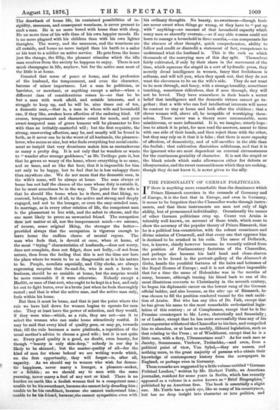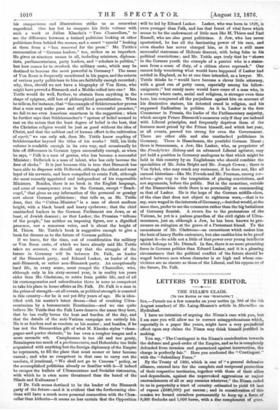THE PERSONALITY OF GERMAN POLITICIANS.
IF there is anything more remarkable than the dominance which Prince Bismarck exercises in the counsels of Germany and of Europe, it is the fact that in Europe, and even in Germany, it seems to be forgotten that the Chancellor works through instru- ments, and that these instruments are men not only of high ability, but of pronounced individuality. Occasionally the names of other German politicians crop up. Count von Arnim is tolerably well known, on account of those trials, which seem to show the accuracy of the popular theory of Prince Bismarck, that he is a political boa-constrictor, with the robust conscience and divine mission of Cromwell, and that every one that opposes him is destined to be crushed in his coils. The name of Delbriick, too, is known, chiefly however because he recently retired from the position of Parliamentary factotum of the Chancellor, and perhaps also because his bald head and clean-shaven face are to be found in the portrait-gallery of the Almanach de Gotha, beside the youthful features of the heirs and heiresses of the Royal Houses of Europe ; and it is not altogether impossible that for a time the name of Hohenlohe was in the mouths of many, because, although tracing his blood back to one of the most illustrious converts to Christianity in the seventh century, he began his diplomatic career on the lowest rung of the German official ladder, and also because, as the alter ego of Bismarck, he was chosen to fill the position rendered vacant by the rash ambi- tion of Arnim. But who has any idea of Dr. Falk, except that he has given his name to the most remarkable ecclesiastical legis- lation of this century ; or of Camphausen, except that he is the Prussian counterpart to Mr. Lowe, rhetorically and financially ; or of Lasker, except that he has more successfully than any of his contemporaries withstood the Chancellor to his face, and compelled
him to abandon, or at least to modify, illiberal legislation, such as that relating to the Press ; or of Windthorst, except that he is a little man, with a fiery, Ultramontane soul? As for such men as Jacoby, Sonnemann, Virchow, Treitschke,—and even, from a political point of view, Von Sybel,—they are names, and
nothing more, to the great majority of persons who obtain their knowledge of contemporary history from the newspapers in England, or perhaps even in Germany. These remarks are suggested by a little volume entitled "German Political Leaders," written by Mr. Herbert Tuttle, an American journalist, resident for some years in Berlin, which has recently
appeared as a volume in a series known as "Brief Biographies," published by an American firm. The book is essentially a slight one. Mr. Tuttle has a quick eye, like so many of his countrymen, but has no deep insight into character or into politics, and his comparisons and illustrations stiike us as somewhat superficial. One has but to compare his little volume with such a work as Julian Klaczko's "Two Chancellors," to see the difference between a trained politician looking at other politicians from behind the scenes, and a smart " special " looking at them from a "box reserved for the press." Mr. Tuttle's enumeration of "German leaders," too, strikes us as imperfect. He gives us nineteen names in all, including ministers, diploma- tists, parliamentarians, party leaders, and "scholars in politics," but how comes he to overlook the military caste, which may be destined to become the most powerful in Germany ? The name of Von Roon is frequently mentioned in his pages, and the retorts of various party politicians to him are faithfully enough recorded ; why, then, should we not have a biography of Von Roon, who might have proved a Bismarck and a Moltke rolled into one? Mr. Tuttle would do well, further, to abstain from anything in the shape of epigram, still less of philosophical generalisation. When he tells us, for instance, that "the example of Schleiermacher proves that a man may make puns and still be a successful preacher," we fail to see even American smartness in the suggestion ; when he further says that Schleiermacher's "system of belief seemed to rest on the axiom that the least degree of belief is the beat, that the Christian religion would be just as good without the idea of Christ, and that the noblest end of human effort is the cultivation of esprit," we can only ask, does Mr. Tuttle know anything of Sehleiermacher beyond the titles of his works ? Still, his little volume is readable enough in its own way, and occasionally he hits off differences in German types successfully enough, as when he says, "Falk is a man of genius, who has become a successful Minister ; Delbrilek is a man of talent, who has only become the first of clerks." It is just because this is true that Bismarck has been able to dispense with Delbruek, although the oldest and most loyal of his servants, and been compelled to retain Falk, although the most recently appointed and independent of his responsible Ministers. Besides, there is no book in the English language, and none of consequence even in the German, except " Brach- vogel," that gives us any information of the personal or gossipy sort about German politicians ; that tells us, as Mr. Tuttle does, that the " Cultus-Minister" is a man of about medium height, with a black beard and heavy eyebrows ; that the chief unattached leaders in the German Parliament are Jews, or at least, of Jewish descent ; or that Luker, the Prussian "tribune of the people," has neither an imposing figure, nor a dignified presence, nor a sonorous voice, and is about the height of M. Thiers. Mr. Tuttle's book is suggestive enough to give a basis for dreams as to the future of German politics.
If we leave, for the time, out of consideration the military or Von Roon caste, of which we have already said Mr. Tuttle takes no account, we should say that the struggle of the future in Germany will lie between Dr. Falk, as leader of the Bismarck party, and Eduard Luker, as leader of the anti-Bismarck, or rather non-Bismarck party. An exceptionally hard life, in every sense, must compel the Chancellor, who, although only in his sixty-second year is in reality ten years older than Mr. Gladstone, to retire from public life, and of all his contemporaries and subordinates there is none so competent to take his place in home affairs as Dr. Falk. Dr. Falk is a man in the prime of strength—at all events, as political strength is counted in this country—for he is not yet fifty years of age. He is iden- tified with his master's latest dream—that of crushing Ultra- montanism by a bureaucratic Erastianism—and we can quite 'believe Mr. Tuttle that the Falk Laws deserve the name they bear, that he has really borne the heat and burden of the day, and that the details of the anti-Vatican campaign are entirely his. He is as fearless and as resolute as his master ; and besides, if he has not the Bismarckian gift of what M. Klaczko styles " cham- pagne-and-porter rhetoric," he has even a rougher tongue and a more sarcastic wit. Camphausen is too old and too gouty, Benningsen too much of a parliamentaire, and Hohenlohe too little acquainted with anything but the foreign diplomacy of the Empire he represents, to fill the place that must sooner or later become vacant ; and who so competent in that case to carry out the resolute, if irrational, "We shall not go to Canossa " policy, as the accomplished politician already so familiar with it—if indeed be escapes the bullets of Ultramontane and Socialist visionaries, with which he is eien more threatened than the hated of the Blinds and Kullmanns ?
If Dr. Falk seems destined to be the leader of the Bismarck party of the future—and it is evident that the forthcoming elec- tions will have a much more personal connection with the Chan- cellor than hitherto—it seems no less certain that the Opposition will be led by Eduard Lasker. Lasker, who was born in 1829, is even younger than Falk, and has that fount of vital force which seems to be the endowment of little men like M. Thiers and Earl Russell, who are also great politicians. A Jew, who has never apostatised, he has all the fascinating power of his race, and even slander has never charged him, as it has a still more successful statesman of Hebraic descent, with being false to his political convictions ; and Mr. Tuttle says truly that he "shows to the German youth the example of a patriot who is a states- man from a sense of duty, of a citizen above reproach." One cannot help wondering what would have happened if Lasker had settled in England, as he at one time intended, as a lawyer. Mr. Tuttle thinks he "would have become a clever little attorney, with a good run of petty cases, especially among his fellow- emigrants ;" but surely more would have come of a man who, in a country where caste, social and religious, is stronger even than here, has conquered all the prejudices against him on account of his diminutive stature, his detested creed in religion, and his supposed Radicalism in polities. As it is, Lasker is the first Commoner in Prussia, the leader of the Parliamentary majority, which accepts Prince Bismarck's measures only if they are imbued with Liberal principles, and frequently deprives them of the features most prized by the Prince himself, and which last year, at all events, proved too strong for even the Government. There are other able and also unattached politicians in Germany. There is Hasselmann, the youthful German Marat ; there is Sonnemann, a Jew, like Lasker, who, as proprietor of the Frankfurter Zeitung and an advanced Liberal agitator, may yet hold a position in Germany analogous to that which might be held in this country by an Englishman who should combine the specialities of Mr. John Bright and Mr. Joseph Cowen ; there is Von Sybel, who may reach any eminence, if he does not, like all earnest historians—like Mr. Fronde and Mr. Freeman, among our- selves—give way to the temptation of placing convictions, and not arguments, before the public. Bit in the meantime, outside of the Bismarckian circle there is no personality so commanding as that of Luker. He is the hope of the German middle-class, of the class that does not object to righteous wars,—that is to say, wars waged in the interests of Germany,—but that would, at the same time, prefer to see the commerce rather than the big battalions of Germany flourish. A sworn foe to the pretensions of the Vatican, he yet is a jealous guardian of the civil rights of Ultra- montanes, just as, although a Jew, he has been known to pro- nounce an eulogium at the grave of a Protestant friend. To the earnestness of Mr. Gladstone—an earnestness which makes him the butt of heavy Berlin caricature, but also enables him to be proof against it—he adds not a little of that power over young intellects which belongs to Mr. Disraeli. In fine, there is no more promising force in German politics than Eduard Lasker, and it is a pleasing circumstance that the political conflict of the future should be waged between men whose character is so high and whose con- victions are so sincere as those of the Liberal, and his opponent of the future, Dr. Falk.































 Previous page
Previous page